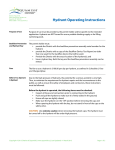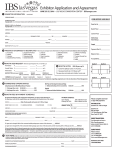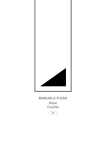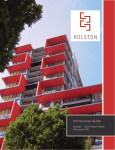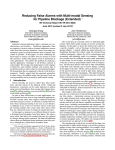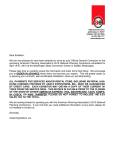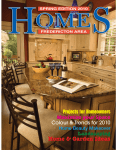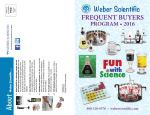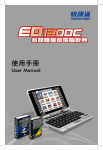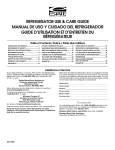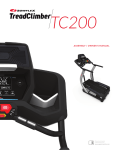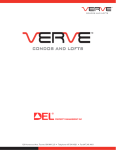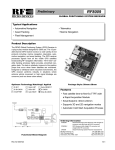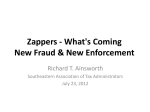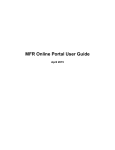Download Phase 3 Resident`s Handbook PDF
Transcript
e m the east market PHASE 3 Resident’s Handbook PHASE 3 Resident’s Handbook THIS HANDBOOK MUST BE LEFT IN THE UNIT FOR FUTURE RESIDENTS Dear EM3 Resident! We want to ensure that all residents are proud to live here and are able to enjoy a safe environment where people treat each other and the property with respect. If you are new to our building we want to wish you welcome with this information. We hope that this becomes a valuable reference tool for all residents – although you must also understand the legal documents that govern all EM3 owners, tenants and visitors *. Let’s all maintain our building, our units and common areas at a high standard! * Important Notice to the Reader * Our Condominium Association is governed by several legal documents including the Condominium declaration, rules, regulations, and bylaws. ALL OWNERS/TENANTS ARE EXPECTED TO BE FAMILIAR WITH AND ABIDE BY THE CONDOMINIUM DECLARATION, BYLAWS & RULES. This Handbook is written in layman’s terms to make it more readable and does not constitute a legal document issued by the Condominium Board or any other entity. Throughout, references have been made to the appropriate legal documents. REFERENCE DOCUMENTS FOR THIS HANDBOOK INCLUDE PHASE 3 LEGAL DOCUMENTS AND INFORMATION AVAILABLE AT: www.theeastmarket.ca/handbook/phase3-publications Condominium Declaration, OCSC Corporation No 735 • East Market Phase 3 Existing and New Rules (as updated on the web site) • Condominium Bylaws • Version 02 December 2008 Most Recent Version see: www.theeastmarket.ca/handbook/phase3-publications/ My Rights - My Responsibilities PHASE 3 Resident’s Handbook Menu Single Double Espresso $1.95 $2.80 Espresso Macchiato $2.10 $2.95 Espresso Con Panna $2.20 $3.05 Authentic Italian Cappuccino $2.75 Regular Large Daily Brew $1.85 $2.00 Americano $1.95 $2.80 Latte $3.25 $3.95 Cappuccino $3.25 $3.95 Mocha $3.95 $4.75 Steamer $3.25 $3.75 Hot Chocolate $3.25 $3.75 Chai Latte $3.95 $4.25 London Fog $3.95 $4.50 Extras: Extra Shot $0.85 Flavor Shot $0.55 Breve $0.85 Breakfast Breakfast Club $4.95 Salmon Bagel $4.95 Sandwiches Pressed Chicken $5.53 Cappicollo and Roasted Vegetables $5.53 Salmon Royal $5.53 Powerhouse $5.53 Roasted Vegetable Wrap $5.53 California Chicken Melt $5.53 Soup of the Day Field of Greens Regular $2.50 Large $4.50 $4.50 Sunshine Salad On multigrain bread or whole wheat wrap with two scrambled eggs, bacon, mozzarella, lettuce and tomato On bagel, smoked salmon and cream cheese On ciabatta with In-house roasted chicken, havarti, sun-dried tomato mayo, lettuce and tomato On ciabatta with Capocollo, in-house roasted vegetables, sun-dried tomato mayo and mozzarella On ciabatta with Smoked salmon, sun-dried tomato mayo, goat’s cheese and tomato On multigrain bread with Tofu, havarti, alfalfa sprouts, lettuce and tomato On whole wheat wrap with in-house roasted vegetables, goat’s cheese, lettuce and tomato On ciabatta with guacamole, tomato & mango topped with mozzarella cheese ( All sandwiches can be made on your choice of: multigrain, whole wheat wrap, or ciabatta ) Fresh greens with dried fruit, mixed nuts & sprouts Fresh greens with diced apricots, walnuts & sprouts ( Add Chicken $3.00; Add Cheese $2.50 ) $4.50 PHASE 3 Resident’s Handbook How do I Contact Who for What? Please provide the Property Manager with contact details for all residents in your unit - whether you are an owner or tenant. You? Superintendent: Property Manager: (PM) It is important that the Property Manager can contact all residents and owners - for emergency and other issues. Mariano Gabriel Tel: 613- 241-7900 • Noise, Safety & Security issues • Building cleanliness • Waste disposal • Problems with common areas • Entry system/directory, keys & FOBs • Booking party room, elevator & moves Rory Gooderham ( PPM Group) 503-39 Robertson Road Ottawa, ON K2H 8R2 Tel: 613-523-9716 Fax: 613-288-0290 Email: [email protected] • Problems with common areas • Problems with your unit • Advice and permission to make changes to units (remodelling) • Issues with neighbours • Safety & Security issues • All other enquiries My Rights - My Responsibilities PHASE 3 Resident’s Handbook PM Administrator: Jodi Girvan (PPM Group) Tel: 613-523-9716 Fax: 613-288-0290 Email: [email protected] Visitor Parking: Registration via telephone: 613-228-7715 Queries: 613-314-5076 • Payments • Correspondence • Records • Murray & Murray Parking Control Services • 24-hour vehicle registration via telephone or online at: www.theeastmarket.ca/handbook/visitor-parking EMERGENCIES Life-Threatening Emergencies & Crimes in Progress: 911 Other Situations Requiring Police: 613-230-6211 Security ( Mon-Fri 12 noon - 8 pm ): 613-241-7900 After Hours Emergency ( PPM Group ): 613-739-8468 Weekend Security & Noise ( Fri-Sun evenings & nights ): 613-567-2737 Ottawa Bylaw Enforcement ( e.g. noise ): 311 Please also notify Property Manager of all complaints and technical difficulties. Community: Community Police Centres: 613-236-1222 Lowertown Community Association: www.lowertown-basseville.ca Safer Ottawa website: www.saferottawa.ca Byward Neighbourhood Watch: [email protected] My Rights - My Responsibilities PHASE 3 Resident’s Handbook Contents 1.0 RETAIL DIRECTORY 09-10 2.0 IN MY UNIT 2.01. CHECKLIST 2.02. ENERGY EFFICIENCY TIPS 2.03. APPLIANCES 2.04. AIR FILTERS 2.05. BALCONIES 2.06. BATHROOMS 2.07. BLINDS 2.08. CAULKING 2.09. COUNTERTOPS 2.10. DOORS 2.11. ELECTRICAL SYSTEM AND OUTLETS 2.12. LIGHT FIXTURES 2.13. EXHAUST FANS 2.14. FLOORS AND CARPETS 2.15. HEATING,VENTILATION AND AIR-CONDITIONING ( HVAC ) 2.16. NOISE 2.17. PETS 2.18. PLUMBING FIXTURES 2.19. REMODELLING 2.20. SERVICES / UTILITIES 11 11 12 13-14 14-15 15-16 16-17 17 18 18 18-19 19-20 20 20 21 21-24 24 25 25-26 26-27 27-28 My Rights - My Responsibilities PHASE 3 Resident’s Handbook Contents 2.21. 2.22. 2.23. 2.24. INSURANCE SINKS STORAGE / BICYCLE LOCKERS WINDOWS 3.0 COMMON AREAS 3.01. CHECKLIST 3.02. BUILDING ACCESS AND SECURITY 3.03. EXERCISEROOM/GYM 3.04. GARBAGE 3.05. HALLWAYS / CORRIDORS 3.06. LOBBY 3.07. MOVING 3.08. NOISE 3.09. PARKING 3.10. PARTY ROOM 3.11. PETS 3.12. SECOND FLOOR TERRACE 3.13. SIGNS AND FLYERS 3.14. SMOKING 3.15. STAIRWELLS 3.16. STORAGE / BICYCLE LOCKERS My Rights - My Responsibilities 28 28-29 29 30 30 30-31 32-35 35 36-38 38 39 39 40 40-41 41-42 42-43 43-44 44 45 45 45 PHASE 3 Resident’s Handbook Contents 4.0 EMERGENCIES 4.1. CHECKLIST ( AM I PREPARED? ) 4.2. POWER OUTAGE 4.3. WATER LEAKAGES 4.4. FIRE My Rights - My Responsibilities 46 46-47 48 49 49-54 PHASE 3 Resident’s Handbook 1.0 RETAIL DIRECTORY Conveniently located at the ground floor level below phases 1 and 3, there are a number of independent retail services in The East Market, serving residents and the general public alike. For up-to-date information: www.theeastmarket.ca/handbook/retail-services HAIR TANGO PICTURE PLUS 180 York St., Unit 104 (corner of York & Cumberland) 613-860-1313 179 George St., Unit 101 (facing Cumberland near the corner of George) 613-241-9470 Hours of operation: Mon, Tue, Thur, Fri: 11:00am - 8:00pm Wed: 12:00pm - 7:00pm Sat: 10:00am - 6:00pm Hours of operation: Mon-Sat: 10:30am - 6:00pm Sun: 12:00pm - 5:00pm Services offered: All haircare services Full aesthetic services Advanced tanning beds Massage Services offered: Picture framing and lamination Posters and art prints Cards and postcards Hair Salon & Tanning Picture Framing & More A 10% discount is offered for East Market phase 1, 2 and 3 residents. 09 My Rights - My Responsibilities PHASE 3 Resident’s Handbook 1.0 RETAIL DIRECTORY [cont.] Conveniently located at the ground floor level below phases 1 and 3, there are a number of independent retail services in The East Market, serving residents and the general public alike. For up-to-date information: www.theeastmarket.ca/handbook/retail-services LINO’S ON YORK XPRESSO 180 York St., Unit 102 (facing York) 613-241-(Lino) 5466 179 George St., Unit 102 (corner of George & Cumberland) 613-321-3554 Hours of operation: Tue-Fri: 9:00am - 6:00pm Sat: 8:00am - 3:00pm Hours of operation: Mon-Wed: 6:30am - 9:00pm Thur-Fri: 6:30am - 10:00pm Sat: 7:00am - 11:00pm Sun: 8:00am - 9:00pm Hair Salon Services offered: Cut and colour specialist Giving you all your hair care needs Café Services offered: Socially responsible organic coffee and tea Breakfast and light meals Delicious desserts Patio www.xpressocafe.ca My Rights - My Responsibilities 10 PHASE 3 Resident’s Handbook 2.0 IN MY UNIT The boundaries of all residential, parking, storage, and retail units are defined in Schedule C of the Condominium Declaration. ? 2.1. CHECKLIST 11 Question Hint √ I need a HVAC contractor, plumber or electrician. What do I do? Names of potential contractors with experience in the building are available on the Phase 3 website. √ √ √ Where are my lint traps? Check inside as well as above your tumble dryer. Where is my electrical panel with all my circuit breakers? Try the grey panel on the wall in your hallway. Try behind a panel under your bathroom sink. √ Where is my main shut-off valve to control water flow to my entire unit? Where are my secondary shut-off valves to control water flow? √ Where is/are my fan coil unit(s) for my HVAC system? Try flipping open the panel at the air intake vents. √ √ Where is/are the filter (s) for my HVAC system? Look in front of your fan coil unit(s). Have I got sufficient insurance for the upgrades to my unit? All upgrades must be insured by the owner so check your home and contents insurance policy. There are several so try near your: bathroom sinks, toilet cisterns, kitchen sink/dish washer, refrigerator, and washing machine My Rights - My Responsibilities 2.2. ENERGY EFFICIENCY TIPS PHASE 3 Resident’s Handbook Closing Blinds √ Closing blinds while you are away from your condo or during the hottest hours of the day is a very effective way to prevent the condo from getting hot, reducing the need to cool it down. Thermostats √ Setting and maintaining the thermostat at a moderate temperature (around 20-22°C; 6872°F) and turning the fans to automatic are easy ways to significantly reduce the energy costs. √ Dryer Lint Traps Regular cleaning of both dryer lint traps will make your dryer more efficient and save energy √ Appliances Refrigerators use the most energy of all of your appliances. To keep the refrigerator energy use down set the refrigerator’s fresh food compartment at 3 - 5°C (37 - 40°F) and the freezer compartment at -15 - -18°C (0°F - 5°F). √ Turn Off Electronics Turning off electronics (i.e. computers, TVs etc...) while they are not being used is not only good for your electronics, it’s good for our Hydro bill. √ Energy Efficient Lights As light bulbs burn out replace them with energy efficient bulbs. My Rights - My Responsibilities 12 PHASE 3 Resident’s Handbook 2.3. APPLIANCES Owner’s Responsibility • Most units have either Whirlpool or KitchenAid appliances installed. Consult the user guide or care and maintenance guide provided with the appliance. If you do not have a maintenance guide, check the manufacturer’s web site: www.whirlpoolcanada.com; www.kitchenaid.ca • Customer Service: 1-800-807-6777 • Care for your stove: • Use only liquid non-abrasive cleaners on ceramic glass-top stoves. • Always wipe with a clean, wet cloth or sponge and dry thoroughly to prevent streaking and staining. Use stainless steel cleaner for stainless steel exterior. • Special cook top Polishing Creme and Scraper can be used to clean and maintain your stove top. Contact manufacturer for advice. • If your stove has a self-cleaning feature, consult the users guide and keep your unit well-ventilated during the self-cleaning cycle to help get rid of heat, odours and any smoke. Do not block stove vent(s). • Care for your microwave and/or hood: • Use only liquid non-abrasive cleaners. • Unplug microwave/hood and consult user manual on how to remove, clean and/or replace grease filters, charcoal filters, cook top light, and microwave oven light. • Care for your dishwasher: • Use a soft, damp cloth or sponge and a mild detergent. Use stainless steel cleaner for stainless steel exterior. • Regularly remove collected particles from the screen at the bottom. 13 My Rights - My Responsibilities Health Hazard 2.3. APPLIANCES [cont.] PHASE 3 Resident’s Handbook • Care for your refrigerator/freezer: • If applicable to your type of appliance, ensure that there is air flow between the refrigerator and freezer sections. • Use a soft, damp cloth or sponge and a mild detergent in warm water. Use stainless steel cleaner for stainless steel exterior. • Consult user guide on how to clean condenser coils and replace light bulbs. Clean condenser coils regularly as it may help save energy. Unplug refrigerator and take care not to damage your floor if you have to move your refrigerator. • Care for your washer/dryer: • Use a non-flammable household cleaner with a soft cloth. • Periodically inspect and replace inlet hoses if bulges, kinks, cuts, wear or leaks are found - to reduce the risk of hose failure. • Empty the primary lint trap inside your tumble dryer after every load to increase the efficiency of your appliance and to avoid fire hazard. If required clean lint trap in hot water and liquid detergent and thoroughly dry it before the next load. • Regularly check and empty the secondary lint trap located on the duct above your tumble dryer. This also increases the efficiency of your appliance and reduces the fire hazard. $-Saver $-Saver Fire Hazards 2.4. AIR FILTERS • In order to keep the air flow strong, your fan coil filter should be replaced about every three months. The filter, which is available in all major hardware stores, is accessed by opening the large panel below the main vent. Some units have two vents and therefore two filters that need replacing. My Rights - My Responsibilities 14 PHASE 3 Resident’s Handbook 2.4. AIR FILTERS [cont.] • The Condo has contracted with a company to replace filters twice a year. Please monitor your own filters in case they need replacing more frequently than what the Condo provides. Should you not be at home when replacements are being done, the Superintendent or Property Manager will accompany the contractor inside your unit. If the vents are inaccessible due to obstructing furniture, replacement filters will be left in our unit so you can change them yourself. 2.5. BALCONIES Phase 3 Rule 11 • As per the Condo Declaration, all our balconies are common elements. However, each unit owner resident has exclusive use of the balcony belonging to their unit. In effect this regulation means that the Condo has right of entry to our balconies to perform repair and maintenance work, or to give access to the utility and service areas. • Please help keep our condo looking tidy and presentable: • ONLY seasonal furniture is permitted on the balconies. Balconies should not be used as storage areas for any items, including bicycles. • Exterior aerials, antennas or satellite dishes are not permitted • Due to the fire hazard, smoke and smell barbecues are not allowed on balconies. • Carpets or other floor coverings, if they retain moisture, can lead to deterioration of the concrete. Experience in other condos has shown that the moisture retained is detrimental to the concrete, and considerable repair costs will be incurred by all of us once this happens. If you need a covering, indoor-outdoor carpeting is preferable, and never glue them to the concrete. And please make sure that there is no water retention underneath. Remember to remove floor coverings when winter comes. 15 My Rights - My Responsibilities Declaration Schedule F Declaration §4.1 Phase 3 Rule 4 PHASE 3 Resident’s Handbook 2.5. BALCONIES [cont.] • • Do not throw anything from the balconies. • Beer bottles have been falling from the balconies. Obviously this is hazardous; also the broken glass will be dangerous to Terrace users. Please ensure that bottles and other items do not roll off your balcony. • Cigarette butts and matches thrown from balconies have lead to damage on people’s balconies - and on one occasion started a fire in the Terrace area. Please be safe and do not throw things off the balconies. Noise: Please be aware that noise on the balconies is much more noticeable to your neighbours. Be considerate and help make our building enjoyable for everyone by keeping the noise level to a minimum. All residents and visitors are bound by the Ottawa Noise Bylaw (see more details in Section 3.16). Phase 3 Rule 4 Fire Hazard Phase 3 Rule 2 & Ottawa Noise Bylaw 2.6. Bathrooms • Sinks. Care for your stainless steel sinks (See Section 2.22) • Extractor fans. To improve efficiency and avoid fire hazards, residents should routinely dust/clean the extractor fans in bathroom ceilings. Make sure fans are turned off first before removing cover. For added safety, turn the appropriate trip-switch off in the electrical panel in your hallway. Most fan covers can be pried carefully a couple of inches away from the ceiling - after which the spring mechanism can be detached and reattached the same way after cleaning. Take care not to force the spring mechanism to ensure that it closes firmly against the ceiling afterwards. My Rights - My Responsibilities Fire Hazard 16 PHASE 3 Resident’s Handbook 2.6. Bathrooms [cont.] • Replacing bathroom fixture light bulb. Several people have asked how to change the bulb in the standard bathroom fixture that was installed by the builder. This fixture is a hanging white frosted glass globe. To access the bulb, pull directly down on the glass globe with one hand while holding the metal “lid” of the globe with the other hand. Pull firmly but gently so as not to break the glass. When you have pulled the globe several centimetres away from the “lid”, you will be able to see two spring clips in the gap. Squeeze these spring clips so that they don’t snap back unexpectedly, while pulling the globe the rest of the way. After you have replaced the bulb, pull the spring clips down again, and slide the glass globe back over them into its original position. 2.7. Blinds Owner’s Responsibility • Consistent style and look from outside: • One of the striking features of our building is its huge windows. As such, your choice of window coverings has a direct impact on the look of our building. In order to maintain a clean, upscale appearance, the Condo Declaration 4.1 c requires that all window coverings must be proper blinds or curtains, and the back must be white, off-white or charcoal in colour, or have a backing to this effect. • If you are installing your own blinds - consider the following: • The exterior windows are made of insulating glass which requires adequate ventilation to reduce glass stress. Therefore, you should ensure that the blinds are lowered at least two inches away from the glass and one inch away from the mullions (vertical metal pieces). In addition, when lowering your shades you should always leave at least one inch open at the bottom near the sill for sufficient airflow. • If you have problems with your blinds, please contact the company that installed them. 17 My Rights - My Responsibilities Declaration §4.1 c Consult Property Manager 2.8. Caulking PHASE 3 Resident’s Handbook Owner’s Responsibility • You are responsible for maintenance of caulking in your unit. • Over time, normal wear-and-tear and the expansion/contraction of materials will loosen caulking or cause some materials to separate. You may notice this where drywall meets concrete, or where tile grout meets tub. • By maintaining the caulking you can avoid water /moisture build-up and subsequent costly repairs to dry wall, tiles, and furniture. $-Saver 2.9. Countertops • Use only liquid non-abrasive cleaners on counter tops. • If you have light coloured granite countertops, always wipe up standing water immediately in order to avoid darkening of the granite by water absorption. 2.10. Doors Owner’s Responsibility • Your front door has an automatic door closer. It is extremely important that all unit front doors close automatically in case of fire. This is part the fire code and our Condo must comply to protect our residents. Over time the door closer may lose power. Notify the Property Manager or Superintendent if your front door does not close automatically so adjustments can be made as soon as possible. My Rights - My Responsibilities Fire Hazard 18 PHASE 3 Resident’s Handbook 2.10. Doors [ cont.] • To prevent fire and smoke from spreading from one unit to another, air from the corridor constantly enters your unit under the front door by positive air pressure. Residents must not restrict this air flow or install an insulation strip on their door as this contradicts an important fire safety measure. • Residents should be aware that the air that enters your unit under the front door by positive air pressure is the only fresh air supply to your unit (other than through open windows or balcony doors). • If your unit has shoji door, the frames are constructed from light yet strong basswood and will stand up to normal use. Avoid twisting them or slamming furniture or other heavy objects into them. Do not force them open or closed. Clean shoji doors with a soft damp cloth and avoid cleaning chemicals and wood finish. Use polishes sparingly. • It is in our interest to maintain a consistent style throughout the whole building. It is also important that the Property Manager has a key to every unit in case of emergency: • Unit owners and residents may NOT change the front door of their unit without written consent from the Board. • Unit owners and residents may NOT change locks or add security locks to their front doors without written consent from the Board. • If you install an alarm system in your unit, please ensure that the code is provided to the Property Manager. Please be assured that the property manager will keep these codes secure. Fire Hazard Declaration §4.1 Consult Property Manager 2.11. Electrical System and Outlets 19 • Wall switches: In several areas of your unit electrical outlets are activated by wall switches. If you notice a light switch that does not appear to turn any light on, its likely function is to activate one of the outlets in that room. My Rights - My Responsibilities Phase 3 Web PHASE 3 Resident’s Handbook 2.11. Electrical System and Outlets [cont.] • Outlets with trip-switches: Electrical outlets that are located near sinks or in exposed areas have a trip-switch built in. If an electrical outlet is not working, check if the switch has been tripped by pressing the "RESET" button. • Electrical panel: If any electrical service in your suite is not working, you should first check your electrical panel. • Your electrical panel contains individual breakers that control separate circuits. These breakers a marked to help you identify which breaker controls which appliances, outlets or other services. • If you do not know the location of your panel, or do not feel comfortable with how breakers function, please ask the Property Manager to give you a demonstration. Consult SuperIntendent 2.12. Light Fixtures • If you plan to add light fixtures by mounting them to the ceiling you must consult the Property Manager first because the ceilings are common elements. Consult Property Manager 2.13. Exhaust Fans • Units have exhaust fans in the kitchen (above the stove), in the bathrooms, and on the tumble-dryer. • It is the resident's responsibility to maintain and clean exhaust fans to ensure their proper function. • Please remember to regularly empty both the primary lint trap in your tumble-dryer and the secondary lint trap above your tumble-dryer. Not doing so is a fire hazard, causes your dryer to use more energy, and makes it less effective. My Rights - My Responsibilities Fire Hazard $-Saver 20 PHASE 3 Resident’s Handbook 2.14. Floors and Carpets • Our floors are high-quality Kahrs or Teka engineered hardwood. These come with a 25 year guarantee and will maintain their appearance provided they are property cared for and maintained. • Care for your wood floors: • Use mats and area carpets in high traffic areas. • Maintain normal interior humidity levels. • Do NOT use the following on your floors: wax conditioners, acrylic wax, steel wool, soap, ammonia -based cleaners, vinegar or detergents. • Never pour water (or allow it to pool) on the floor • Use a lightly damp cloth and/or a proper wood cleaner. • If you have Kahrs floors: A full care and maintenance guide is available at www.kahrs.com. • If you have Teka floors see the Property Manager for a care guide. • Care for your carpets by: • Vacuuming regularly • Quickly remove any spots and spills • Use mild clear liquid detergent solutions or appropriate speciality products to remove stains on carpets. • Absorb wet spills by blotting rather than rubbing or scrubbing. 2.15. Heating, Ventilation and Air-Conditioning (HVAC) 21 • System description. This building is equipped with an efficient four-pipe central HVAC system which can be individually controlled in your unit. The chiller unit on the roof generates cold water which is circulated throughout My Rights - My Responsibilities Declaration §5.1 Phase 3 Web PHASE 3 Resident’s Handbook 2.15. Heating, Ventilation and Air-Conditioning (HVAC) [cont.] the building to individual fan coil units in each residential unit, where the cold water is converted to cold air and then forced out through the ducts. A similar system with a hot water boiler generates hot air for warming. • Basic points. Your HVAC system will work most effectively if you keep the following points in mind: • It is a “closed” system in that it recycles air within your unit. Warm and humid air from outside disrupts this process, so you must keep all windows and balcony doors closed in order for the system to be effective. • Except when the chiller is switched off during winter (November-March), at which time A/C will not be available, heating and cooling is available in your unit at all times throughout the year. • Your air-conditioning (A/C) will not overcome heat gain from direct sunlight. Please ensure that your blinds are drawn under direct sun. • It is far easier (and less costly) for the system to keep a suite cool or hot than to cool or heat it. Therefore, even if you are away during the day, draw the blinds and keep the temperature in your unit moderate by running the A/C or heating at moderate levels. • Replace your filters when required as described above. • Your fan coil unit has a separate circuit breaker in your electrical panel. Check if the breaker is off (has been “tripped”). • Condensation. Because today’s condominiums are more airtight than those of the past, lack of fresh air into a home may allow the humidity levels to increase considerably. Condensation or ice on the windows is a sign that the humidity is too high for existing weather conditions. If the humidity is not carefully controlled, water damage to the window frame, paint and drywall may occur. Damage of this type is not covered under warranty. Phase 3 Web My Rights - My Responsibilities $-Saver 22 PHASE 3 Resident’s Handbook 2.15. Heating, Ventilation and Air-Conditioning (HVAC) [cont.] • Some hints on dealing with excess humidity: • Air your condominium regularly, especially if it has been left completely closed up all day. Allow for some infiltration of fresh air by opening windows slightly in different areas of the condominium. Turn your thermostat to OFF when windows/doors are open. • If condensation persists, leave the heating/cooling fans on by turning the thermostat to “On” instead of “Auto”. • Do not cover up fan coil vents or block air return vents. • While bathing, washing or cooking, use the exhaust fans and/or open a window to ensure the excess moisture is released. Avoid moisture-producing activities such as hanging wet clothes to dry, running a humidifier, or growing excessive numbers of houseplants. • Do not lower/close your blinds and/or curtains completely - but leave a gap at the bottom to allow a good circulation of air to the windowpanes. • Electric baseboard. Where necessary, your unit also contains an electric baseboard heater as a supplemental heating source in very cold temperatures or if the central heating system is temporarily disabled in an emergency. • Energy conservation. Currently, energy consumption affects your condo fees or rent. Because energy costs are covered collectively under the condo fees we must all do our small part to help reduce the energy usage such as: • Use warm or cold water for washing clothes • Ensure that dishwashers are full before running them • Lower your blinds to reduce solar heating or heat loss • Ensure that windows are closed and lights are turned off when you have left for a prolonged period of time 23 My Rights - My Responsibilities $-Saver PHASE 3 Resident’s Handbook 2.15. Heating, Ventilation and Air-Conditioning (HVAC) [cont.] • Regularly ensure that thermostats are set to a reasonable temp. • The A/C system in the building is designed to provide internal unit temperatures of 24°C (76°F) to a maximum of 6-7°C (12-14°F) below outside temperatures (in line with applicable guidelines). Setting unit temperatures below this level in the summertime may cause the system to become unbalanced and negatively affect A/C throughout the building. 2.16. Noise • Noise: Be considerate and help make our building enjoyable for everyone by keeping the noise level to a minimum. • Ottawa Noise Bylaw: All residents and visitors are bound by the Ottawa Noise Bylaw (2004-253) stating that one must not disturb the peace and comfort of others between 11pm and 7 am on weekdays, between 11 pm and 9am on Saturdays, and between 12 am and 12 pm on Sundays. There are specific rules for equipment and construction noise - you should familiarise yourself with the actual Bylaw text available at: www.ottawa.ca/residents/bylaw/common/noise_en.html • Ottawa Noise Bylaw infraction: Report any Noise Bylaw infractions to the City of Ottawa (Telephone 311) as well as to the Property Manager. My Rights - My Responsibilities Phase 3 Rule 2 Ottawa Noise Bylaw 24 PHASE 3 Resident’s Handbook 2.17. Pets If pet owners fail to follow the applicable rules, their pet can be deemed to be a nuisance by the Board and ordered permanently removed from the property: Declaration §3.6 and 4.2 • Residents can keep no animal, livestock, or fowl of any kind other than domestic pets defined as: no more than two (2) dogs or two (2) cats (or a combination of two of the foregoing); two (2) canaries, budgies or other small birds; or an aquarium of goldfish or tropical fish. • All pets must be kept under personal supervision and control by leash or in a carrier when entering and exiting the Units and property. • Each pet owner must ensure that any defecation by any pets must be cleaned up by the pet owner, so that the common elements, including outside walls and walkways, are neat and clean at all times. • Pets are not allowed access to the Second Floor Terrace. • Attack dogs are not allowed in any Unit. • No breeding of animals for sale is allowed in or around any Unit. Declaration §4.2.d 2.18. Plumbing Fixtures • Shut-off valves: In the event of a water leak from your unit or from your appliances/toilets you should stop the water flow by turning off all shut-off valves. You can minimize damage to your own and neighbouring units: • The supply of water to your unit is generally controlled by a main shut-off valve located in either your kitchen or your bathroom - often behind a panel. • Individual/secondary shut-off valves control the water flow to sinks, the dishwasher, the washing machine, the toilet, and (in some cases) the refrigerator in your unit. 25 My Rights - My Responsibilities Declaration §3.6 Phase 3 Rule 5 Phase 3 Rule 1c Declaration §4.2.d Phase 3 Web $-Saver 2.18. Plumbing Fixtures [cont.] PHASE 3 Resident’s Handbook • It is good practice to shut off the water supply to the washing machine when it is not in use. • Low-flush toilets: Low-flush toilets have been installed in your units as required by existing regulations. As such it may at times be necessary to flush twice in order to empty your toilet. • Non-emergency leakage from sinks and toilet. • If water leaks from faucet/reservoir into sinks/toilets you should notify the Superintendent and Property Manager to ensure that it is not causing water damage. It is then the owner’s responsibility to organise to have leaks fixed. • Timely repair of non-emergency leakages conserves water. • When emergency leakage occurs - see Section 4.3 Owner’s Responsibility 2.19. Remodelling • Do I need permission? • Common elements, including windows, balconies, any concrete columns or other concrete elements, demising walls between units, plumbing that passes through your unit, are not owned by you. • If you wish to make renovations or additions that affect any common elements, you must first contact your board of directors for permission. The board must be confident that such changes will not adversely affect other owners or the building. • Changes solely of a decorative nature are allowed and the Condominium Declaration defines what constitutes “decorative” and what constitutes “structural” changes. • The Board strongly encourages everyone to consult the Property Manager before making any changes in case they are seen as structural. My Rights - My Responsibilities Declaration §4.2 Consult Property Manager 26 PHASE 3 Resident’s Handbook 2.19. Remodelling [cont.] • Painting? When painting, it is important that you do not remove, even temporarily, the wall mounted fire alarm plate. Doing so can cause trigger a false alarm or fault in the system, the cost of which will be your responsibility. Unused paint and rags with linseed oil on them are considered hazardous waste, and may not be disposed of using the waste facilities in the building. Try not to purchase more paint than needed. If you end up with more paint than you expected, painting an extra coat is a good way to use the extra paint, while maximizing the life of your paint job. If product label indicates flammable or hazardous contents - the container must not be stored in the lockers. • Noise? When having any renovations done, please remember that such noise can easily disturb your neighbours. The rules and regulations of the condo require that all such renovations and repairs be limited to daytime hours. Check also the Ottawa Noise Bylaw also with respect to equipment and construction noise (see more details in Section 3.16). Fire Hazard Health Hazard Phase 3 Rule 2 & Ottawa Noise Bylaw 2.20. Services/Utilities 27 • Condo Fees. Heating, air conditioning, electricity, hot and cold water and sewer utilities are all included as part of your monthly condo fees. Your monthly condo fees also cover insurance for the building and units as a whole and maintenance of the common areas such as hallways, elevators, lobby, garage, mechanical equipment, windows and building exterior. We employ a management company to handle various aspects of the management of the building, including collecting condo fees. Contact the Property Manager to arrange for Condo fee payment. • The backbone infrastructure for telephone, cable and other communications is brought into a central hub in your unit, typically located in a closet. From this hub, services are then distributed to multi port outlets, one of which is typically located in each of the living room, bedroom and den areas. My Rights - My Responsibilities Consult Property Manager 2.20. Services/Utilities [cont.] PHASE 3 Resident’s Handbook Each multiport outlet contains coaxial cable and telephone/ network jacks. This allows you or a professional to setup or change telephone, cable TV and internet networking within your unit. • Telephone. Each resident must arrange for telephone service themselves with any local provider. Note that, you do not need a telephone service provider for the enterphone to function (see also section 4.2) • Cable TV. Our building is currently serviced by both Rogers Cable and Bell ExpressVu. Each resident must arrange for their own service. • High Speed Internet. Our building is currently serviced by both Rogers Cable and Bell ExpressVu. Each resident must arrange for their own service. 2.21. Insurance Owner’s Responsibility • The condominium building insurance only covers the building and units as a whole. • Be sure to arrange for your own contents insurance, as this is not covered in the condominium building insurance that is part of your condo fees. • Each resident must arrange extra insurance for any upgrades and improvements to their units. Refer to the Standard Unit Bylaw to determine what constitutes an upgrade from original Unit design. 2.22. Sinks Standard Unit Bylaw Owner’s Responsibility • Care for your stainless steel sinks (kitchen and bathrooms as applicable): • Use only liquid non-abrasive cleaners on stainless steel sinks. My Rights - My Responsibilities 28 PHASE 3 Resident’s Handbook 2.22. Sinks [ cont.] • Regularly rinse and towel dry your stainless steel sink after use to keep its surface exposed to oxygen. • Oxygen reacts with chromium in the steel to form a strong, highly protective chrome oxide film on the surface of your sink. It is this film that makes stainless steel resistant to corrosion and gives it a remarkably long life. • Non-emergency leakage from sinks and toilet • If water leaks from faucet/reservoir into sinks/toilets you should notify the Superintendent and Property Manager to ensure that it is not causing water damage. It is then the owner’s responsibility to organise to have leaks fixed. • Timely repair of non-emergency leakages conserves water. • When emergency leakage occurs - see Section 4.3 Owner’s Responsibility 2.23. Storage/Bicycle Lockers 29 • Some owners purchased storage/bicycle lockers along with their units and were allocated specific lockers. If unsure, check with the Property Manager which unit is yours. • Each storage/bicycle locker shall only be used to store bicycles or other non-hazardous materials. Each unit owner must keep their locker in a clean and sightly condition. • Items must not be stored on top of lockers or in hallways - this is a contravention of fire regulations and as such items will be removed by the Condo Association. • A limited number of bicycle racks are available for rent from the Condominium Association. My Rights - My Responsibilities Declaration §4.4 Fire Hazard Contact Property Manager PHASE 3 Resident’s Handbook 2.24. Windows • As part of your Condo fee, the exterior windows are cleaned at least once a year. Residents are responsible for cleaning the exterior windows along their balconies as well as the interior glass surface of the balcony railings. If desired, residents can make individual arrangements with the window cleaning company to have all exterior windows cleaned. Contact the Property Manager for further information. 3.0 Common Areas “Common Areas” means all areas that are not defined as residential, parking, storage, and retail units in Schedule C of the Condominium Declaration. 3.1. Checklist √ √ Question Hint I am having a party. How do I book the Party Room? Contact the Superintendent. I’m having visitors. Can they park in the garage? To park in our building, visitors must register and may only park in designated spaces on the P1 level. Register cars and check the latest rules by phone or online: Telephone (Murray & Murray): 613228-7715 www.theeastmarket.ca/handbook/visitor-parking My Rights - My Responsibilities 30 ? PHASE 3 Resident’s Handbook 31 Question Hint √ My garbage item does not fit in the garbage chute on my floor. What do I do? Carry your items to the garbage room on the ground floor. √ What do I put in which recycling bin? Check up-to-date rules in the City of Ottawa: www.ottawa.ca/city_services/recycling_garbage/apartment/ √ How do I dispose of hazardous materials? Contact the City of Ottawa for advice (Telephone: 311) √ What do I do if the gym equipment I planned to use does not work? Report it to the Superintendent and Property Manager. √ Where can I keep my bike? Bikes are not allowed on elevators. You can bring the bike into the building through garage entrances and store them in your parking unit, in your storage/bike locker, or rent a bike rack space at the bike racks. √ Someone tried to enter the building and I suspect that they are not residents. Politely ask if the person lives here and avoid giving them access. Report incident to Superintendent and Property Manager. Don’t let anyone into the building if you do not know them. √ Where are the stairwells for emergency exits from my unit? Look for red/lit EXIT signs and explore several alternative exits √ Where are the stairwells for emergency exits from the parking garage? Look for red/lit EXIT signs and explore several alternative exits My Rights - My Responsibilities PHASE 3 Resident’s Handbook 3.2. Building Access and Security The safety of our residents is of paramount concern. Building security ultimately relies on resident vigilance. Security is a continuing challenge in the area we live in. • Security Cameras • Security cameras have been installed at key security points in the building. • Key FOB system • Notify the Superintendent immediately if your key FOB is stolen or lost so that it can be cancelled. • The building entrance, parking entrances, terrace entrance, elevator lobbies and amenity rooms are all equipped with proximity key fobs. To unlock a door, simply hold your FOB up to the reader, wait for a click, and open the door. • The benefit of this system is its ease-of-use as well as its security features, which among other things allows the Property Manager to add and delete entrants, thereby blocking FOBs of residents that no longer live in the building or blocking lost/stolen FOBs. • “Show Your FOB”: We ask that everyone be vigilant about not letting strangers into the building. Also, we ask that you show your own electronic key fob when you follow someone else into the building. This way, the other person won’t feel awkward asking if you live in The East Market, and you won’t feel like they suspect you! If someone who you don’t know follows you in, we encourage you to introduce yourself and ask if they live here. If in doubt, ask to see their electronic key fob. It helps security, and is a good way to meet your neighbours. • If you are a resident (and feel comfortable in doing so), ask politely if somebody is not showing their FOB. If you are uncomfortable in doing so, an alternative would be to walk away and wait for the other person to enter first. My Rights - My Responsibilities 32 PHASE 3 Resident’s Handbook 3.2. Building Access and Security [cont.] • Enterphone system • An enterphone system is located in the building’s entry vestibule. When a visitor calls you from the vestibule, your landline phone rings and you can give them access to the building by pressing 6 on your phone. • You can check who is calling you from the vestibule by accessing the security camera monitoring the entry vestibule. It is shown on your TV Channel 19 for Bell customers and Channel 69 or 998 for Rogers Digital customers. Check with the Superintendent and your TV service provider if you are experiencing problems. • For security purposes it is important not to let anybody into the building if you do not know them. • Entry keys • Notify the Superintendent immediately if your keys are stolen/lost. • You have an entry key for your unit front door as well as a key for all common areas including main stairwell doors entering from George Street and locker room doors. • Access to parking garages • Notify the Superintendent immediately if your garage opener is stolen/lost. • If you or your visitors use the garage doors, please read this carefully. Also, please pass this on to any visitors that you will have use the visitor parking area. With everyone’s help by following these instructions, we hope to minimize the following two problems: 1. Security: There have been a number of break-ins when someone has followed a resident / visitor into the garage. 2. Garage Door Collisions: There have also incidents of vehicles colliding with the garage doors. • You will be responsible for any damage to your vehicle, as well as the cost of garage door repair replacement, in situations where these instructions are not followed. 33 My Rights - My Responsibilities PHASE 3 Resident’s Handbook 3.2. Building Access and Security [cont.] • One Car, One Click. To discourage unauthorized people entering behind you, and to avoid garage door collisions, only one person / vehicle should enter at a time. Do not attempt to follow another vehicle into the garage while the door is open. Also, please watch for anyone following you in, and pause at the bottom of the ramp until the door closes. • Opening Garage Door for Visitors. For security, the garage door does not stay open long. After your visitor calls you, you should wait 5-10 seconds before pressing the 6 key to open the garage door. This will give your visitor time to get back in their car before you open the door. • Fobs should not be given to visitors to operate the garage door. The door does not remain open long enough for cars to safely access the garage by this means, and damage to vehicle and/or door is likely. (The fob reader at the garage door is for use by cyclists who have lockers that are accessed via this entrance, since bicycles are not permitted on the elevators). • If the Door Has Started to Close. For your safety and to avoid potential damages to your vehicle, if the door has started to close do not attempt to get through the doorway before the door closes, as there’s a high risk that you will collide with the door. Instead, wait and re-open the door as described below. • If You Have to Wait. If you have to wait for other traffic or pedestrians after the door has opened, do not attempt to proceed through the doorway once the traffic has passed, but before the doors closes. Again, there’s a high risk that you will collide with the door as it closes. Re-open the door as described below. • When Exiting. If there is another vehicle exiting ahead of you, you should wait at the bottom of the ramp until that vehicle has left. This way, the door will open a second time for you when you proceed up the ramp. My Rights - My Responsibilities 34 PHASE 3 Resident’s Handbook 3.2. Building Access and Security [cont.] • Reopening the Garage Door. If you are unable to safely proceed through the door for any of the reasons listed above, simply re-open the door as follows: If you are a resident entering the garage, press your remote control button to re-open the door. In the case of a visitor entering the garage, they should return to the enterphone to call you again. If you are exiting, back up to the bottom of the ramp and proceed forward again to re-open the door. • Note that, exit stair wells in the garage only provide access to the outside, so that if someone inappropriately gains access to the garage they cannot access the rest of the building. 3.3. Exercise Room/Gym • The Gym Room is located on the 2nd floor for the enjoyment of all Phase 3 residents: • The Gym is open daily 7 am - 11 pm. Check poster on the door for the latest opening hours. • The Gym Room is cleaned regularly by Condo staff. • Wipe down equipment after use using supplied towels & spray bottle. • Use extra extractor fan activated by switch by the door. • Keep outside doors/windows closed to let the Air-Conditioning system work efficiently. • Use the equipment carefully. • Be respectful of your neighbours - Keep noise level to a minimum. Don't drop weights and lower them gently during workouts. • Ensure that you leave the room the way you found it. 35 My Rights - My Responsibilities $-Saver Phase 3 Rule 2 3.3. Exercise Room/Gym [cont.] PHASE 3 Resident’s Handbook • Please treat our common elements with respect-as if they were your own! Other than normal wear and tear each resident/owner is financially responsible for any damages to or loss of common elements caused by negligent behaviour by themselves or their family and guests. • Equipment problems: • The equipment is regularly maintained by contractors/staff. Please report to the Superintendent and Property Manager if any equipment fails. • Some of the electrical equipment has a trip-switch that prevents overheating during extended use. Please contact Superintendent. Phase 3 Rule 5 $-Saver Report to Superintendent / Property Manager 3.4. Garbage Do not stuff large or folded items into the garbage chute, such as folded cardboard boxes, blankets, etc. that may expand and block the chute • System description. Our building is equipped with a state-of-the-art recycling system that allows separation at each floor - of garbage and recyclables. With the push of a button at your floor’s garbage chute door, the system directs garbage or recyclables to the proper bin in the ground floor garbage room. • Saving costs and the environment: • Contaminated recycling including plastic bags and household waste defeats the object of the system. • Our Condo and therefore you incur additional costs: - From the City of Ottawa when we deliver contaminated recycling. My Rights - My Responsibilities $-Saver 36 PHASE 3 Resident’s Handbook 3.4. Garbage [cont.] - From the City of Ottawa if hazardous waste is not disposed off according to regulations. - When our staff has to spend more time re-sorting garbage and cleaning up the garbage room. - Trying to reduce garbage odours that could be minimized if everybody sealed and bagged/ double -bagged their waste. • Some hints on managing garbage and recycling in our building: • Bag/Double-bag and Seal: R duce garbage smell by bagging or double-bagging and sealing before depositing waste into the garbage chute or main garbage room. • Follow instructions on how the system works as posted in the garbage/recycling chute rooms on each floor. • Ask the Superintendent about disposing of hazardous materials. • Garbage chute operation - Do not use chute between 10 pm and 8 am: • You must bag/double-bag and seal your garbage! Bags that break on impact create excessive odours in the ground floor garbage room. The garbage chute is used only for small and lightweight bags of household waste and some clean recycling items. Recycled items are later removed from their bags by staff. • Carry the following items to the garbage room on the ground floor: • Glass • Cardboard • If in doubt - ask Superintendent 37 • Cat litter • Oversized items • Anything that can block the garbage chute is a fire hazard. • Do not deposit cigarettes, ashes, flammable liquids, aerosol cans or other hazardous materials in the chutes. My Rights - My Responsibilities Consult Superintendent Phase 3 Rule 7 Consult Superintendent Phase 3 Rule 7 Fire Hazard 3.4. Garbage [cont.] PHASE 3 Resident’s Handbook • The Garbage Room: The garbage room on the main floor has several bins, which are used for various purposes. Please use the correct bin - the environment is our common responsibility. Note that plastic bags are considered contamination in a recycle bin. Consult up-to-date City of Ottawa rules: www.ottawa.ca/city_services/recycling_garbage/apartment/ • The large blue metal bins are for non-recyclable garbage only. • The large yellow metal bins are for paper and cardboard only. Remove all plastic bags before depositing recyclables into the bins. • The small blue plastic bins closest to the entrance are for plastics and glass containers. Clean & dry containers and remove all plastic bags before depositing recyclables into the bins. 3.5. Hallways/Corridors • While our cleaners do their utmost to keep the hallways and corridors clean, it is important that we all try to help - particularly by wiping boots and shoes clean before entering the building. • Mats, boots and other items must not be left in the hallway outside your unit. Such items will be removed. There are several reasons for this rule including: • Items are a tripping hazard including obstructing residents’ ability to safely evacuating the building during a fire. • Items in the hallways look untidy and degrade the image of our building. • As a Condo we are together liable for any damages caused because of negligence in enforcing this rule. Because of this costly liability, if residents fail to remove such items after a warning the Property Manager will do so. My Rights - My Responsibilities Phase 3 Rule 5 Fire Hazard $-Saver 38 PHASE 3 Resident’s Handbook 3.6. Lobby • During the winter season staff removes snow from the front entrance as well as mats in the lobby to protect the floors and reduce the amount of snow and salt that is tracked into the building and our units. • To avoid damage to the lobby area, all residents must bring bicycles into the building through garage entrances and not through the lobby. This helps save refurbishment expenses. 3.7. Moving 39 $-Saver Phase 3 Rule 12 • Consult Phase 3 Rule 12 for details on moving and elevator use. • Furniture and equipment shall be moved into or out of the building only by booking the elevator designated for such purpose (the “service elevator”). • The hours for moving are Monday to Saturday, from 10 am to 4 pm, and 6:30 pm to 9:30 pm. There are NO exceptions. Moving shall not take place on Sundays or public holidays. • All moves must be booked ahead of time. Contact Superintendent to book your move. • On your move day, contact the Superintendent again to reconfirm. We’ll show you where to go. We’ll ensure that an elevator is dedicated to your move and that the protective pads are installed in the elevator. • When moving into the building, a deposit is required against damages to the elevators, lobby or other common areas. Assuming there is no damage, this deposit will be returned in full after your move is complete. My Rights - My Responsibilities Consult Superintendent $-Saver 3.8. Noise PHASE 3 Resident’s Handbook • Noise: Be considerate and help make our building enjoyable for everyone by keeping the noise level to a minimum. • Ottawa Noise Bylaw: All residents and visitors are bound by the Ottawa Noise Bylaw (2004-253) stating that one must not disturb the peace and comfort of others between 11 pm and 7 am on weekdays, between 11 pm and 9 am on Saturdays, and between 12 am and 12 pm on Sundays. There are specific rules for equipment and construction noise - you should familiarise yourself with the actual Bylaw text available at: www.ottawa.ca/residents/bylaw/common/noise_en.html • Ottawa Noise Bylaw infraction: Report any Noise Bylaw infractions to the City of Ottawa (Telephone 311) as well as to the Property Manager. Phase 3 Rule 2 Ottawa Noise Bylaw 3.9. Parking • Resident parking: • Located in the underground parking levels accessed from Cumberland Street (P1, P2 and P3) as well as ground level parking accessed from George Street. • Specific parking units have been allocated to those owners who purchased one. • Use your clicker to open the garage doors - alternatively there are FOB-readers at all garage entrances. • Visitor parking: • Located on parking level P1 accessed from Cumberland Street. • Visitors’ cars must be registered. Residents may NOT park in the visitor parking area. Familiarize yourself with the rules and register the visitor’s vehicle online at: My Rights - My Responsibilities Phase 3 Rule 9 Phase 3 Web 40 PHASE 3 Resident’s Handbook 3.9. Parking [cont.] www.theeastmarket.ca/handbook/visitor-parking/. You can also call Murray & Murray Parking Control Services: 613-228-7715. Any vehicles parked in contravention of visitor parking rules may be ticketed and/or towed. • An intercom marked “179 George Street” is located at this entrance, from which visitors can call your unit. Allow a few seconds for your visitor to get back in his/her car, then press 6 on your landline telephone to open the garage door. Signs will direct the visitor to the visitor parking area. Remind your visitors never to give anybody else access to the building. • An intercom is located at the P1 elevator lobby. Once again your visitor will need to call your unit so that you can open the door to the elevator lobby by pressing 6 on your landline telephone. Remind your visitors never to give anybody else access to the building. • Nothing except a motor vehicle and secured bicycle should be stored in parking units. $-Saver Phase 3 Rule 9 Fire Hazard 3.10. Party Room • The Party Room is located on the 2nd floor for the enjoyment of all Phase 3 residents: • Use the equipment carefully. Other than normal wear and tear - each resident/owner is financially responsible for any damages to or loss of common elements caused by negligent behaviour by themselves or their family and guests. • Be respectful of your neighbours - Keep noise level to a minimum • In line with the Ottawa Noise Bylaw, residents and visitors must not disturb the peace and comfort of others between 11 pm and 7 am on weekdays, between 11 pm and 9 am on Saturdays, and between 12 am and 12 pm on Sundays ( see more details in Section 3.8 ). 41 My Rights - My Responsibilities Phase 3 Rule 2 & Ottawa Noise Bylaw 3.10. Party Room [cont.] PHASE 3 Resident’s Handbook • The Party Room closes at 2 am every day • The outside Terrace closes at 10 pm Sunday-Thursday and 11 pm Friday and Saturday. • Leave the Party Room in the same condition you found it. • Keep outside doors/windows closed to let the Air-Conditioning system work efficiently. • Booking the Party Room: • The Party Room can be booked through the Superintendent. • Please ensure that the room is clean after use and take care of the furniture and equipment. • A non-refundable deposit is payable for booking the party room. The deposit is returned only if the Party Room is left in the same condition as it is found. • A Party Room booking does not include the Terrace area and BBQ to allow all residents access. • Noise: No resident shall permit noisy, rowdy or raucous behaviour in or adjacent to the Party Room nor any behaviour or noise which disturbs the comfort and quiet enjoyment of other residents, their families, guests, visitors, and persons having business with them (see more details in Section 3.8). $-Saver Phase 3 Rule 10 $-Saver Phase 3 Rule 2 & 10 3.11. Pets If pet owners fail to follow the applicable rules, their pet can be deemed to be a nuisance by the Board and ordered permanently removed from the property: Declaration §3.6 and 4.2 • Residents can keep no animal, livestock, or fowl of any kind other than domestic pets defined as: no more than two (2) dogs or two (2) cats (or a combination of two of the foregoing); two (2) canaries, budgies or other small birds; or an aquarium of goldfish or tropical fish. Declaration §4.2.d My Rights - My Responsibilities 42 PHASE 3 Resident’s Handbook 3.11. Pets [ cont.] • All pets must be kept under personal supervision and control by leash or in a carrier when entering and exiting the Units and property. • Each pet owner must ensure that any defecation by any pets must be cleaned up by the pet owner, so that the common elements, including outside walls and walkways, are neat and clean at all times. • Pets are not allowed access to the Second Floor Terrace. • Attack dogs are not allowed in any Unit. • No breeding of animals for sale is allowed in or around any Unit. Declaration §3.6 Phase 3 Rule 5 Phase 3 Rule 1c Declaration §4.2.d 3.12. Second Floor Terrace • The terrace adds significant beauty and provides an attractive environment within our downtown building. In order to ensure that this remains a place that all residence may enjoy - please treat the area and your fellow residents with respect. • Closing time: The outside Terrace closes at 10 pm Sunday-Thursday and 11 pm Friday and Saturday. • Barbeque Etiquette: • Be careful not to spill food/grease in and around the BBQ, in the hallways or the elevators • Pick up after yourself and/or your guests • Clean the grill after using it • Turn off the gas (underneath the BBQ) once you are finished • Be respectful of your neighbours - Keep noise level to a minimum 43 My Rights - My Responsibilities Phase 3 Rule 2 & 7 3.12. Second Floor Terrace [cont.] PHASE 3 Resident’s Handbook • Replace Terrace furniture to its original configuration • Pets do not have access to the terrace. This rule was initiated after a period of time when some residents had been walking their pets and failed to pick up the animal waste. Our Terrace is a place to enjoy, cook and eat and as such animal waste creates a health risk • Please treat our common elements with respect-as if they were your own! Other than normal wear and tear each resident/owner is financially responsible for any damages to or loss of common elements caused by negligent behaviour by themselves or their family and guests. • Noise: No resident shall permit noisy, rowdy or raucous behaviour in or adjacent to the Party Room nor any behaviour or noise which disturbs the comfort and quiet enjoyment of other residents, their families, guests, visitors, and persons having business with them (see more details in Section 3.8). New Rule 20 July 2007 Phase 3 Rule 5 $-Saver Phase 3 Rule 2 & 10 & Ottawa Noise Bylaw 3.13. Signs and Flyers • Please do not post any type of sign around the building. This includes notices for parties in the Party Room and use of the notice board in the mail room. No flyers/notices are allowed to be distributed except official Condo notices. My Rights - My Responsibilities 44 PHASE 3 Resident’s Handbook 3.14. Smoking • Smoking is prohibited in all elevators and all common elements. • Currently, smoking is permitted only in designated area on the Terrace away from the building to respect those that live above the area. Smokers should observe no-smoking signage and use the supplied ash/cigarette receptacle. Phase 3 Rule 12 3.15. Stairwells • All stairwells lead to street level for fire safety. Look for red/lit EXIT signs and explore several alternative exits. • Stairwell M (West) provides an exit from the garage levels up to Cumberland street level. For fire safety reasons one cannot exit from the stairwell into the garages. • Stairwell N (East) provides an exit from the garage levels out/up to George street level and from the 2nd floor amenity area down to George street level. For fire safety reasons one cannot exit from the stairwell into the garages. • Stairwells K & L are located in the centre of the building. These provide access to all floors and Cumberland street level. 3.16. Storage/Bicycle Lockers 45 • See Section 3.23 My Rights - My Responsibilities Fire Safety PHASE 3 Resident’s Handbook 4.0 Emergencies Life-Threatening Emergencies & Crimes in Progress: Other Situations Requiring Police: Security ( Mon-Fri 12 noon - 8 pm ): After Hours Emergency ( PPM Group ): Weekend Security & Noise ( Fri-Sun evenings & nights ): Ottawa Bylaw Enforcement ( e.g. noise ): Please also notify Property Manager of all complaints and technical difficulties. EMERGENCIES 911 613-230-6211 613-241-7900 613-739-8468 613-567-2737 311 4.1. Checklist (Am I Prepared?) Question Hint Locate my electrical panel as well as trip-switches on specific power outlets √ How do I turn on/off power in my unit? √ How do I shut off water to my unit? Locate my main and any secondary shut-off valves √ What are my escape routes? Locate all stairwells leading from my unit to the street level √ Where are the alarm pull stations? Red pull stations are located at multiple places in corridors on every floor. My Rights - My Responsibilities 46 ? PHASE 3 Resident’s Handbook √ √ √ When I call 911.... What does an continuous alarm mean? Hint Inform the fire department of your location: Unit x, 179 George Street, Ottawa, K1N1J8 Prepare to evacuate Evacuate safely √ Do I stay or do I go? Review the To Go or To Stay section. √ What do I do if I am infirm and need help to evacuate? √ √ What if I see a fire hazard? How do I keep smoke out of my unit? Notify the Property Manager or Superintendent if special assistance is required. Notify the Superintendent/Property Manager. Question What does an intermittent alarm mean? Where can I get more information? 47 Keep duct tape at hand - just in case. 1. Fire Department or 2. www.ofm.gov.on.ca or 3. Property Manager: • Fire In Your Apartment Building (Pamphlet) • Plan Ahead - Fire Safety in Apartment Buildings (Pamphlet) • If You Hear The Fire Alarm And Cannot Leave Your Apartment (door sticker) My Rights - My Responsibilities 4.2. Power Outage PHASE 3 Resident’s Handbook • Be Prepared. Locate your electrical panel as well as trip-switches on specific power outlets (see Section 3.11). • Find more information and current updates at www.getprepared.ca. • During a power outage: ( from Brochure at: www.getprepared.ca/_fl/power-outages-what-to-doeng.pdf): 1. Check if the outage is limited to your unit, check the individual breakers in your electrical panel as well as trip-switches on specific power outlets (see more in Section 3.11). 2. If your neighbours’ power is also out, notify the Superintendent/ Property Manager and the electric supply authority. 3. Turn off all tools, appliances and electronic equipment. Turn your thermostat(s) down to minimum to prevent damage from a power surge when power is restored. Also, power can be restored more easily when there is not a heavy load on the electrical system. 4. Turn off all lights, except one inside and one outside, so that both you and hydro crews outside know that power has been restored. 5. Don’t open your freezer or fridge unless it is absolutely necessary. A full freezer will keep food frozen for 24 to 36 hours if the door remains closed. 6. Never use charcoal or gas barbecues, camping heating equipment, or home generators indoors. They give off carbon monoxide. Because you can’t smell or see it, carbon monoxide can cause health problems and is life-threatening. 7. Use proper candle holders. Never leave lit candles unattended and keep out of reach of children. Always extinguish candles before going to bed. 8. Listen to your battery-powered or wind-up radio for information on the outage and advice from authorities. My Rights - My Responsibilities Resident’s Responsibility Notify Superintendent & Property Manager $-Saver 48 PHASE 3 Resident’s Handbook 4.3. Water Leakages • Be Prepared. Locate your main and any secondary shut-off valves (see Section 2.18). • When Leakage occurs: 1. Close all the shut-off valves in your unit including main valve, and as if secondary valves that exist in your unit such as individual sinks, dishwasher, washing machine, toilets, and refrigerator. 2. Notify the Superintendent and Property Manager. 3. Mop up and collect any continuing water leakage to minimise water damage to your unit and neighbouring units. • Non-emergency leakage from sinks and toilet. • If water leaks from faucet/reservoir into sinks/toilets you should notify the Superintendent and Property Manager to ensure that it is not causing water damage. It is then the owner’s responsibility to organise to have leaks fixed. • Timely repair of non-emergency leakages conserves water. Resident’s Responsibility Notify Superintendent & Property Manager $-Saver Owner’s Responsibility 4.4. Fire 49 • BE PREPARED. Locate all stairwells leading from your unit to the street level for possible evacuation (see Section 3.15). • Find more information and current updates at www.ofm.gov.on.ca. • Publication from the office of the Fire Marshall: www.ofm.gov.on.ca/english/publications/communiques/1996/96-035at1.asp • Monthly/Annual Tests. Monthly and annual fire inspections are performed in our building. Notices are posted to residents in advance and warnings are also given over the Public Address system immediately before the My Rights - My Responsibilities Resident’s Responsibility 4.4. Fire [ cont.] PHASE 3 Resident’s Handbook inspection/ testing starts. • Fire Inspection in units. During the annual fire inspection it is necessary to access our individual units to check smoke detectors, heat sensors and valves. The Superintendent will accompany the fire inspector to the indi vidual units. • Sprinkler systems are found in all retail units, moving room, 2nd floor amenity rooms, garbage chute, and garbage room. • Our building is equipped with a two stage fire alarm system: 1. Evacuation Alarm (continuous alarm). Evacuate safely from building. 2. Alert Alarm (intermittent signal). Standby and prepare to evacuate. • If you discover fire: 1. Leave the fire area 2. Close all doors behind you 3. Activate the Fire Alarm by using pull stations 4. Use exit stairwells and leave the building immediately 5. Telephone the City of Ottawa Fire Services from a safe place by dialling 911 (Never assume that this has been done). Know the correct address and location of the fire in the building. 6. Do NOT use elevators 7. Do NOT return until it is declared safe to do so by the Fire Department Official • If you hear the evacuation fire alarm tone: 1. Before opening the door, feel knob for heat. If not hot, brace yourself against door and open slightly. If you feel air pressure or hot draft, close the door quickly. 2. If you find no fire or smoke in the corridor, close door behind you, take unit key and leave by nearest exit. My Rights - My Responsibilities Official Fire Safety Plan for EM3 Official Fire Safety Plan for EM3 50 PHASE 3 Resident’s Handbook 4.4. Fire [ cont.] 3. Do not use elevators. 4. If you encounter smoke in the corridor or stairwell, consider taking an alternative exit where it may be clear, or return to your unit. 5. Listen for instructions or information which may be given by authorized personnel over the voice communication system. 6. If instructions indicate or situation warrants that an evacuation is necessary, then take unit key, close door behind you and leave by the nearest exit. If you encounter smoke in the corridor or, stairwell, consider taking an alternate exit or return to your unit. • Once inside the stairway: 1. If you encounter smoke on your way down the stairs, do not continue. 2. Leave the stairwell onto the closest available floor area and proceed to an alternate stairway. Open the door carefully and if there is no smoke, continue down the stairway and leave the building. 3. If you cannot use any stairway to exit the building, return to your unit (if possible) or enter an available floor area and bang on suite doors until you are able to take shelter. 4. Never go to the roof because smoke rises. Doors to the roof are locked and you could become trapped. 5. Remember, stay low to the ground if you are in smoke filled environment. The air is cleaner near floor level. • If you cannot leave your unit: 1. Close the door. 2. Unlock door for possible entry of fire fighters. 51 My Rights - My Responsibilities Official Fire Safety Plan for EM3 Official Fire Safety Plan for EM3 4.4. Fire [ cont.] PHASE 3 Resident’s Handbook 3. Dial 911 and tell the Ottawa Fire Service where you are, then signal to fire fighters by waving a sheet from a window. 4. Seal all cracks where smoke may get in by using wet towels or sheets or masking tape. 5. Crouch low to the floor if smoke comes into the room. 6. If suite fills with smoke, move to balcony (close door behind you) - bring a phone if possible. 7. If you have no balcony, move to the most protected room and partially open a window for air (close window if smoke comes in). 8. Wait to be rescued. Remain calm. Do not jump. 9. Listen for instructions or information which may be given by authorized personnel over voice communication system. • In-suite silence switch: The use of the in-suite silence switch is voluntary. If you plan to stay in your suite, review the STAY OR GO section. Protect yourself from smoke. 1. To silence speakers, touch the silencing switch until signals are silenced (located near your electrical panel). 2. When the in-suite silence switch is activated, it will silence the connected speaker(s) within your suite for approximately 10 minutes before resounding. 3. If the building's fire alarm system is still active, the silenced speaker will re-sound when the timer (10 minutes) expires. The speaker may be re-silenced as described above. 4. The speaker must sound for 10 seconds before it can be silenced. 5. The fire alarm system signal will reactivate if there is a status change with the building's alarm system or a voice announcement is made. My Rights - My Responsibilities Official Fire Safety Plan for EM3 52 PHASE 3 Resident’s Handbook 4.4. Fire [ cont.] 5. The fire alarm system signal will reactivate if there is a status change with the building's alarm system or a voice announcement is made. 6. The in-suite silence switch does not silence the smoke alarm. • To Go?? Or To Stay?? www.ofm.gov.on.ca/english/publications/communiques/1996/96-035at1.asp Your safety depends on the right decision! 1. Most of the time, the best thing to do in a fire is to leave the building as soon as possible. If you let this opportunity pass, you must be prepared to protect yourself from smoke and other effects of fire until you are rescued or told by the fire department that it is safe to leave. 2. When Should I go? 1. As soon as possible when you hear the fire alarm or discover a fire. 2. When the fire is in your suite. 3. When the fire is on your floor or the floor below you. 3. When should I stay in the suite? (Inform the fire department) 1. If you encounter smoke in the corridor on your floor. 2. If you encounter smoke in the exit stairs. 3. If instructed to remain in the suite by fire department personnel handling the fire emergency. 4. If you are physically unable to use the stairs. • I have heard that most people die trying to evacuate during a fire. Is this true? Experience shows that people who evacuate in the early stages of a fire can safely reach the outside. Most people die because they attempt to leave the building through smoke-filled 53 My Rights - My Responsibilities Publication from Office of Fire Marshall 4.4. Fire [ cont.] PHASE 3 Resident’s Handbook outside. Most people die because they attempt to leave the building through smoke-filled corridors and stairs in the advanced stages of a fire. Although the conditions are different for each fire, this could occur as early as 10 minutes after the start of the fire. If you made the decision to stay in the suite during the fire emergency, do not change your mind and attempt to evacuate later. Please refer to item No. 1 for details of when evacuation is and is not appropriate. If you encounter smoke during evacuation, look for an alternate route that is clear of smoke, return to your suite or seek refuge with other occupants on the nearest floor. Do not use the elevator for evacuation (except under direction of the fire department) and never go to the roof since it is not designed as an exit. • What else should I know? Many people are reluctant to evacuate unless they are certain that there is a real fire. This problem is made worse by nuisance alarms. Remember, a real fire grows for every minute that you delay and you may lose the only opportunity to evacuate safely. For this reason, all occupants who are able should begin evacuation procedures immediately upon hearing the alarm. If you made an initial decision to stay in your suite when a fire emergency occurs, do not attempt to evacuate in the advanced stages of the fire. You cannot outrun the effects of fire and smoke and will be placing yourself in extreme danger. Each suite is designed as a fire compartment and will afford you a degree of protection during the fire emergency. However, smoke spread into your suite is very likely so be prepared to protect yourself from smoke for the duration of the emergency. This may be a long time. My Rights - My Responsibilities 54 PHASE 3 The Board of Directors wishes to thank Salim Uddin of the Xpresso Cafe for his generous contribution to the East Market Phase 3 community by underwriting the entire cost of the design and printing of the Residents’ Handbook. Appreciation is also due to the EM3 Health, Safety & Facilities Committee for the many hours spent writing and editing the final version. THIS HANDBOOK MUST BE LEFT IN THE UNIT FOR FUTURE RESIDENTS


























































